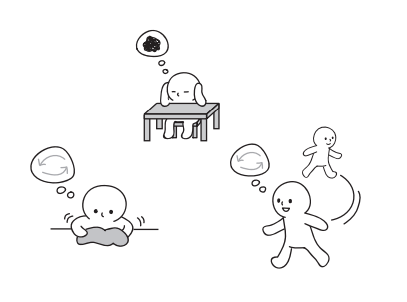Difference between revisions of "Thinking in Action/OG"
Jump to navigation
Jump to search
Creating prototypes or diving into fields deepens your thinking.
***
▼In this context
▼Therefore
Sfrancisco (talk | contribs) (Added category) |
Sfrancisco (talk | contribs) (Edited related pattern) |
||
| Line 5: | Line 5: | ||
|image= <!-- Provide the filename of the image to be displayed (e.g., Design_pattern.png) --> | |image= <!-- Provide the filename of the image to be displayed (e.g., Design_pattern.png) --> | ||
|contributor= [[Takashi Iba]], [[Mami Sakamoto]] | |contributor= [[Takashi Iba]], [[Mami Sakamoto]] | ||
|source= Iba & Sakamoto (2011)<ref>Iba, T., & Sakamoto, M. (2011). [http://dl.acm.org/citation.cfm?doid=2578903.2579166 Learning patterns III: a pattern language for creative learning]. In ''Proceedings of the 18th Conference on Pattern Languages of Programs (PLoP 2011)'' (p. 29). | |source= Iba & Sakamoto (2011)<ref>Iba, T., & Sakamoto, M. (2011). [http://dl.acm.org/citation.cfm?doid=2578903.2579166 Learning patterns III: a pattern language for creative learning]. In ''Proceedings of the 18th Conference on Pattern Languages of Programs (PLoP 2011)'' (p. 29). New York:ACM.</ref>; Iba (2010)<ref>Patlet mentioned in Iba, T. (2010). [https://pdfs.semanticscholar.org/6e59/51c886e73a6efdc88f7be185d2f9336025ef.pdf Designing a Pattern Language for Creative Learners].</ref> | ||
|dataanalysis= <!-- If applicable, list of data analyses used for mining the pattern separated by a " , "comma --> | |dataanalysis= <!-- If applicable, list of data analyses used for mining the pattern separated by a " , "comma --> | ||
|domain= <!-- Learning domain the design pattern belongs to (e.g., General, Math, Algebra) --> | |domain= <!-- Learning domain the design pattern belongs to (e.g., General, Math, Algebra) --> | ||
| Line 46: | Line 46: | ||
'''Deepen your thought process by making prototypes and doing fieldwork.''' | '''Deepen your thought process by making prototypes and doing fieldwork.''' | ||
:• Making prototypes with easily manipulated medium by {{Patternlink|Prototyping}}, and you will improve your ideas and gain new insight. | :• Making prototypes with easily manipulated medium by {{Patternlink|Prototyping (Iba and Sakamoto)}}, and you will improve your ideas and gain new insight. | ||
:• Acquire knowledge from doing fieldwork by {{Patternlink|Field Diving}}, and the knowledge will help you to deepen your thoughts. | :• Acquire knowledge from doing fieldwork by {{Patternlink|Field Diving}}, and the knowledge will help you to deepen your thoughts. | ||
Latest revision as of 17:57, 6 June 2017
| Thinking in Action | |
| Contributors | Takashi Iba, Mami Sakamoto |
|---|---|
| Last modification | June 6, 2017 |
| Source | Iba & Sakamoto (2011)[1]; Iba (2010)[2] |
| Pattern formats | OPR Alexandrian |
| Usability | |
| Learning domain | |
| Stakeholders | |
“The way to get started is to quit talking and begin doing.”— Walt Disney
“The only source of knowledge is experience.” — Albert Einstein
You have been studying by reading books, articles, or other written materials.
It is difficult to get out of the situation when you are stuck.
- • It is not easy to change your understanding without interaction between you and your environment.
- • It is difficult to foresee all of possible challenges before carrying out your plan.
- • Creation and practice make you aware of your limitations.
Deepen your thought process by making prototypes and doing fieldwork.
- • Making prototypes with easily manipulated medium by Prototyping (Iba and Sakamoto) (Prototyping (Iba and Sakamoto)), and you will improve your ideas and gain new insight.
- • Acquire knowledge from doing fieldwork by Field Diving (Field Diving), and the knowledge will help you to deepen your thoughts.
References
- ↑ Iba, T., & Sakamoto, M. (2011). Learning patterns III: a pattern language for creative learning. In Proceedings of the 18th Conference on Pattern Languages of Programs (PLoP 2011) (p. 29). New York:ACM.
- ↑ Patlet mentioned in Iba, T. (2010). Designing a Pattern Language for Creative Learners.
